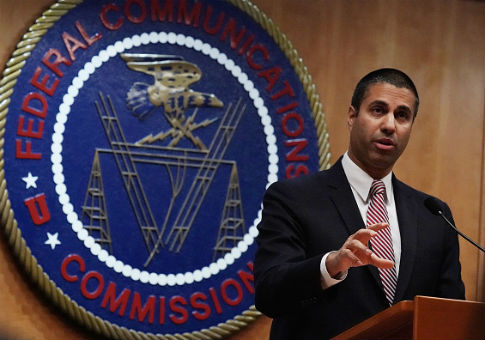The Federal Communications Commission is weighing model state legislation to tax broadband service providers.
Documents obtained by the Washington Free Beacon indicate that the FCC's Broadband Deployment Advisory Committee has advanced model state legislation for the establishment of Rural Broadband Deployment Assistance Funds.
As written, the legislation aims to increase "private sector investments" in "low population density or high cost" areas by mandating that "broadband dependent services" contribute an "equitable and non-discriminatory amount" to these funds. The controversy revolves around whether or not this constitutes a new tax on companies and services relying on the internet.
There is also contention over the definition of "broadband dependent service." As initially proposed, it would cover any "subscription-based retail service for which consumers pay a one time or recurring fee" that requires broadband internet. It would include "entities that financially benefit from" state broadband systems such as "advertising providers."
The broad definition drew rebuke from several members of the advisory committee for fear that it could apply to not only large companies like Google, Facebook, and Amazon, but also small businesses and nonprofit organizations.
Elizabeth Bowles, the advisory committee's chairwoman, told the Free Beacon that several states already had similar funds in existence to expand telephone access, and this measure was meant to bring those funds "into the 21st century." She stated that much of the confusion surrounding the legislation was over how expansive the definition of "broadband dependent service" had become.
"When the definition was revised early this year it became overly broad and we attempted to fix that at this last meeting," Bowles said. "It is my opinion that we might need to revisit the definition again to ensure that small businesses are not being reached."
Bowles asserted that the legislation was "never" intended to apply to "every single business utilizing the internet." Furthermore, she added that the legislation was not drafted with any "certain companies" in mind. It is instead meant to ensure businesses requiring high-speed internet to operate were "contributing to the ecosystem."
Despite efforts to clarify the legislation, the confusion over its meaning was on display earlier this month when the advisory committee deliberated on the matter. In a narrow 12-to-11 vote with 8 abstentions, the committee's members decided to move the model legislation forward with heavy amendments.
A representative for the FCC told the Free Beacon the final language would be released before the commission's January meeting. They also confirmed the definition of "broadband dependent services" had been changed to incorporate concerns that it could apply to small businesses.
The representative elaborated that the advisory committee's recommendations were not synonymous with official FCC policy. Citing the opposition of FCC chairman Ajit Pai and other commissioners to "burdensome taxes and regulations," they added that there was no assurance the legislation would be adopted.
The internet industry and technology companies are expected to oppose the measure.
"It's critical for the entire internet ecosystem to promote internet access when 87 percent of rural Americans have one or no choices for high-speed internet," Scott Haber, a spokesman for the Internet Association, told the Free Beacon. "However, a new tax on internet services is likely to make them more expensive, which in turn makes it harder for Americans—especially low-income individuals—to use the internet."
Opponents are also hesitant about a provision in the model legislation that any sales taxes levied upon "broadband dependent services" be remitted to the deployment assistance fund, instead of state coffers.
Regardless of the final version, state legislators will have the ultimate say, according to a state government affairs executive who spoke to the Free Beacon regarding the topic. The executive requested anonymity because their clients are likely to be impacted by the model legislation.
"Lobbyists and advocacy groups in favor of the bill can still push legislators to amend it to fit the needs of their states," the executive said. "In some cases, they'll take the model bill and introduce it as is ... but a lot of times these measures serve as a first draft for states to tinker with and make their own."
The executive predicted that any final product was likely to be controversial.
"This model legislation is going to pan out along conventional political fault lines," they said. "Red states are probably going to take a softer approach to the issue, while blue states run wild at the thought of another revenue stream."
